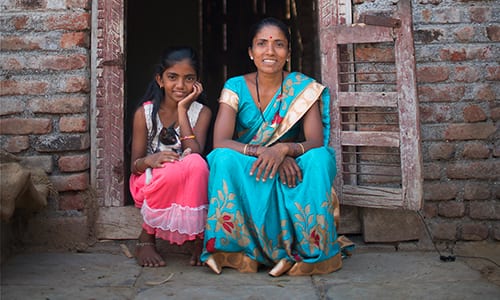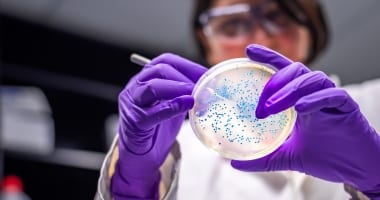We sat down with Katherine Pickus, Divisional Vice President, Global Citizenship and Policy, Abbott and John Ginascol, Vice President, Nutrition Supply Chain, Abbott to speak with them about the evolution of shared value at this healthcare leader and what more is needed to accelerate the adoption of shared value initiatives within the company.
To what extent and how are you seeing societal needs as a source of business opportunity for your company’s future growth and success?
Katherine Pickus: Abbott is a global healthcare company, devoted to helping people live their best lives. So shared value is core to our business model; our products address critical health needs. This puts us in a strong position to further apply the unique assets of our business – from our medical technology and nutrition expertise, to our understanding of consumers’ health needs – to find new ways to improve lives.
John Ginascol: We’re also pursuing shared value opportunities that businesses in any industry can understand. We’re looking across our supply chain to identify the key ‘bottlenecks’ that limit the growth of our business and the communities we serve to find solutions that unlock the potential of both.
For example, Abbott developed a program to strengthen the capabilities and capacity of local dairy farmers in India. This initiative is increasing the potential of both our nutrition business and rural communities by producing high quality milk that Abbott can use for manufacturing nutritional products in India. This work is bringing these farmers into the organized dairy industry, which, in turn, is strengthening our high-quality supply chain. Through an educational training program aimed at increasing quality milk production, we’re also building stronger local economies.
What internal shifts need to be made to really deliver on your company’s intentions to create shared value? What changes have already been made? To what extent is your company organized to be able to execute shared value successfully?
KP: Like many global companies, Abbott is working quickly to meet emerging needs in markets around the world. Cross-business integration helps Abbott understand the multi-dimensional global issues impacting its business, like climate change and rural development. We’ve made changes to better apply our expertise in supply chain and quality excellence to issues that we know are affecting both our ability to do business, and local economies.
JG: That’s an important point that is reflected in our work in India. We recognized key local needs, and implemented both farmer training and infrastructure development to create a sustainable, quality source of raw materials for our products. Because of these initiatives, farmers are reaping the benefits of better dairy techniques by being part of an organized value chain. In fact, within the first months of milk collection, 730 farmers regularly contributed their milk across all five of the new dairy centers we created.
And as our business grows in India, we’re going to need more and more quality dairy. So we’ve expanded the program to five more villages. Eventually, our goal for the expanded program is to reach up to 1,500 farmers. And now that collection has successfully begun in the first five villages, we’re expanding the scope of our training program to drive even better quality milk and higher volumes. We’re doing this by drilling down on technical demonstration as well as the economics of a dairying business. We’re starting small because we recognize the need to phase in programs like this over time, to ensure they’re self-sustaining over the long term.
In the past five years, to what extent and how have your company’s relationships with stakeholders (government, NGOs, employees, consumers/customers) evolved to create more win-win opportunities for business and society?
KP: In recent years, Abbott and leading NGOs are starting to think and work differently than in the past. We’ve moved beyond a funding relationship to a true partnership to solve issues in which our business and our people have a stake.
Many partners are now looking to become a part of our value chain in new ways. For example, we worked with TechnoServe and Partners In Health in Haiti to increase farmer productivity and incomes with training, financing and expertise. And now, TechnoServe is helping us with our India dairy farming work to improve not only farmer livelihoods but our supply of quality milk – which accelerates value for many stakeholders.
Which organizations or sector(s) do you believe are becoming the most sophisticated in creating or enabling shared value creation? Why?
KP: Nonprofits and governments are becoming savvier about the resources and solutions that corporations can bring to communities. Nonprofits are finding new ways to approach companies with solutions to problems that bring the expertise of businesses to bear on urgent issues. And, governments are beginning to understand the true scale of value that businesses can bring to meet the needs of their people.
There’s also a growing recognition that profit with purpose is a good thing – that the best solutions will come from market-driven, self-sustaining efforts. This allows companies to address social challenges not just with the best intentions, but by acting in the collective best interest – for companies and society.
We’re seeing this evolution in India in particular. The mandate for companies to spend 2 percent of their net profit on social development has facilitated an environment where all sectors are looking to maximize the opportunity the mandate provides. Making boards responsible for this mandate has led to a strong focus on innovation in social projects that’s driving greater integration with business operations in order to bring in sustainability and scalability. Both nonprofits and governments in India see the value of companies creating market-based solutions and want to see a greater level of partnership.
Looking ahead, what do you believe is needed to accelerate shared value within your organization? What are three wishes for the coming year that would make your job easier?
JG: We need to expand our infrastructure to ensure that purpose and profit are aligned at every turn. At Abbott, we use the power of health to help people build better lives and stronger communities. We want that conversation to happen in the hallways, around the water cooler and at every decision table. But we also know that conversation is not enough; we must create the systems that allow us to better collaborate across our organization and address social needs.
We also need to empower teams across the company to find creative new ways to address business & social challenges. The same innovation that happens in our labs and R&D centers needs to extend out to other parts of our business as well – from our supply chains to our sales teams. By tapping the ingenuity of our employees, we’ll be able to find new answers that work for our business and our communities faster.
KP: And finally, more collaboration across companies working on similar issues would drive change. We know that we can’t do it by ourselves, and that means working with other companies that bring their own unique assets and expertise to issues that affect us all. With the UN’s 17 Sustainable Development Goals, there’s a real opportunity to align with other companies, and the global community, to accelerate progress.




